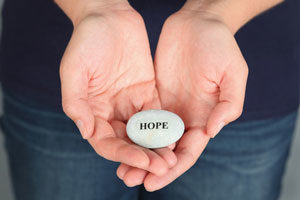“The very least you can do in your life is to figure out what you hope for. The most you can do is live inside that hope, running down its hallways, touching the walls on both sides.”
– Barbara Kingsolver, Animal Dreams
 Depression has a way of robbing its victims of hope. So I want you to know that I have hope for your recovery. I know from my own past experience with depression and the experiences of my clients that it is possible to recover from depression and live the happy life that you deserve. You can get your energy back, feel like your old self again, and rediscover your joy and passion for life.
Depression has a way of robbing its victims of hope. So I want you to know that I have hope for your recovery. I know from my own past experience with depression and the experiences of my clients that it is possible to recover from depression and live the happy life that you deserve. You can get your energy back, feel like your old self again, and rediscover your joy and passion for life.
If you are suffering from depression, you are not alone. About 7% of adults in the U.S. are clinically depressed at any given time. The good news is that depression is very treatable. Eighty percent of people who begin treatment for depression start feeling better in only four to six weeks. So why wait? The sooner you reach out for help, the sooner you can start feeling better!
How do you know if you are depressed? The symptoms are a little bit different for everyone. Some of the symptoms you may experience are:
- Feeling sad or hopeless (pessimistic), or both
- Feeling irritated or angry over little things
- Feeling tired or drained of energy
- Loss of interest in activities that used to be fun
- Difficulty sleeping or sleeping too much
- Difficulty concentrating and making decisions
- Physical aches and pains, such as stomachaches and headaches
- Feeling guilty, worthless, or helpless
- Changes in appetite
- Significant weight loss or weight gain
- Tendency to withdraw from others or isolate yourself
- Thinking about death or suicide
Research shows that Cognitive Behavior Therapy (CBT) is the most effective form of psychotherapy for treating depression, and this is the approach I use. I will start by teaching you some basics about depression and Cognitive Behavior Therapy. And I will provide you with emotional support and plenty of encouragement and validation as we work together. We will talk about how our thoughts and behaviors can influence our mood, making depressive symptoms worse or better. I will teach you skills you can use to reduce your depressive symptoms on your own and prevent yourself from spiraling downward into depression.
Periods of depression can be triggered by life events, such as a significant loss or traumatic experience. Depression sometimes develops from having experienced childhood abuse or neglect, poverty, or cultural oppression. Therefore, your path to healing may also include helping you recover from a loss or heal old wounds from the past. The path to recovery is a bit different for everyone. I will teach you some practical tools and help you find your own path to recovery.